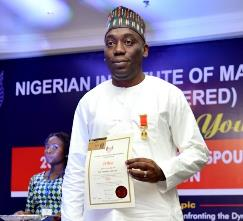
The Director General, Nigerian Maritime Administration and Safety Agency (NIMASA), Dr. Bashir Jamoh has stated that marine pollution prevention will remain its focus.
He reiterated the agency’s commitment to ensuring effective pollution prevention and control in the Nigerian maritime domain in order to continue to create an enabling environment for the sector to thrive.
Jamoh who made this assertion while speaking at the 7th meeting of the National Standing Committee on International Oil Pollution Compensation (IOPC) Fund implementation in Nigeria emphasized the agency’s commitment to the effective implementation of the IOPC Fund regime by ensuring optimal utilization of the instrument in the country.
Represented by NIMASA Director Marine Environment Management Department, Mrs. Aishatu A. Jidda, Jamoh enjoined all stakeholders to abide by the provisions of all enabling international instruments as provided for by the International Maritime Organization (IMO).
He added that the Convention for Civil Liability for Oil Pollution Damage 1992 and the International Convention on Establishment of an International Fund for Compensation for Oil Damage 1992 which Nigeria is signatory remains relevant to the growth and development of the Nigerian maritime sector.
His words: “Nigeria has domesticated these Conventions and we are qualified to reap the benefits therein. We at NIMASA have a register for contributing oil receivers in Nigeria. We urge all stakeholders to play their part to ensure reports emanating from Nigeria are in line with acceptable standards.
“It is good we have a record as a contributing oil receiver and because it is our obligation to ensure we give the IOPC Fund, the names of all contributing oil receivers in Nigeria. NIMASA is committed to ensuring Nigerians enjoy all the benefits from being signatory to these International Conventions.”
The MIMASA helmsman reaffirmed the importance of the conventions to Nigeria’s marine environment management just as he pointed out that the facilitation of domestication by NIMASA led to the constitution of the National Standing Committee (NSC) on IOPC Fund in September 2004 and five other Sub-Committees in October 2016, with a mandate to ensure seamless implementation of both conventions.
A statement issued in Lagos and signed by its Assistant Director, Public Relations, Mr. Edward Osagie stated that the five subcommittees include the Sub-Committee on Fish Stock/Fisheries; Sub-Committee on Identification of Receivers of Contributing Oil; Sub-Committee on Compilation of Oil Report; Sub-Committee on Claims Handling and Sub-Committee on Pricing Index.
According to the statement which was made available to Maritime Bits the objective of the meeting was to deliberate on the resolutions reached at the 6th meeting including; the development of a roadmap on the establishment of a Local Oil Pollution Compensation Fund by local insurance companies; drawing up national guidelines on fish stock/fisheries, as well as the collation of recent data on contributing oil receivers and contributing oil products imported.
Other resolutions include drawing up national guidelines on fish stock/fisheries; collation of recent data on contributing oil receivers, contributing oil products imported, and quantity of product and details of coastal movement of Low Pour Fuel Oils (LPFO) and High Pour Fuel Oils (HPFO) from the refineries and condensates as well as distribution of COR-1 Forms and carrying out sensitization programmes.










